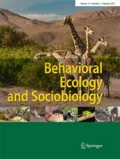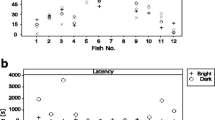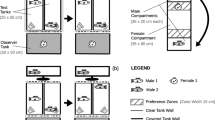Abstract
Many animals raise and lower aggressiveness after recent wins and losses, respectively. Individuals that differ in internal/external conditions could also differ in their responsiveness to winning and/or losing experiences. Personality traits have been suggested to have close links with an individual’s responsiveness to environmental stimuli. Whether the responsiveness to winning-losing experiences is related to personality traits, however, remains unclear. Using a mangrove killifish, this study tested the hypothesis that personality traits (aggressiveness and boldness) and responsiveness to winning/losing experiences are linked because of their common associations with competitive ability. We also measured oxygen consumption rates to evaluate the importance of energy supply to the responsiveness. The results showed that aggressiveness, but not boldness or oxygen consumption rate, was associated with competitive ability and affected by winning/losing experiences. The fish’s responsiveness to winning-losing experiences was dependent only on competitive ability, but not aggressiveness or boldness; individuals with better (instead of worse) competitive abilities showed greater decreases in aggressiveness in response to losing experiences. The strong signals from multiple losing experiences together with worse competitors also exhibiting low aggressiveness (floor effects) may have given rise to these unpredicted results. Furthermore, (1) aggressiveness, boldness and oxygen consumption rate were positively correlated both before and after experience treatments and (2) individuals that were bolder or had higher oxygen consumption rates had higher increases in aggressiveness after experience treatments, consistent with the notion that individuals that are able to pay high metabolic costs can afford to behave boldly and aggressively and to raise aggressiveness further.
Significance statement
To adapt to changing environments, animals often show plasticity in behaviours. Personality traits have been suggested to have close links with responsiveness, such that bolder and more aggressive individuals are less responsive to environmental stimuli. Using a mangrove killifish, our study showed that aggressiveness and boldness did not affect whether or how the fish responded to recent wins or losses. Competitive ability, however, played an important role; better competitors had greater decreases in aggressiveness after losing experiences, contrary to our expectations. These results together with the results of previous studies of the fish suggest that the fish’s responsiveness to winning-losing experiences could be sensitive to its internal conditions, the strength of the stimuli and potential floor/ceiling effects. This study also showed that individuals that are able to pay high metabolic costs are able to behave boldly and aggressively and to raise aggressiveness further.





Similar content being viewed by others
References
Araya-Ajoy YG, Dingemanse NJ (2017) Repeatability, heritability, and age-dependence of seasonal plasticity in aggressiveness in a wild passerine bird. J Anim Ecol 86:227–238. https://doi.org/10.1111/1365-2656.12621
Armstrong DP (1991) Aggressiveness of breeding territorial honeyeaters corresponds to seasonal changes in nectar availability. Behav Ecol Sociobiol 29:103–111. https://doi.org/10.1007/BF00166484
Arnott G, Elwood RW (2009) Assessment of fighting ability in animal contests. Anim Behav 77:991–1004. https://doi.org/10.1016/j.anbehav.2009.02.010
Austad SN (1983) A game theoretical interpretation of male combat in the bowl and doily spider (Frontinella pyramitela). Anim Behav 31:59–73. https://doi.org/10.1016/S0003-3472(83)80173-0
Bakker TCM (1986) Aggressiveness in sticklebacks (Gasterosteus aculeatus L.): a behaviour-genetic study. Behaviour 98:1–144. https://doi.org/10.1163/156853986X00937
Balzarini V, Taborsky M, Wanner S, Koch F, Frommen JG (2014) Mirror, mirror on the wall: the predictive value of mirror tests for measuring aggression in fish. Behav Ecol Sociobiol 68:871–878. https://doi.org/10.1007/s00265-014-1698-7
Bégin J, Beaugrand JP, Zayan R (1996) Selecting dominants and subordinates at conflict outcome can confound the effects of prior dominance or subordination experience. Behav Process 36:219–226. https://doi.org/10.1016/0376-6357(95)00031-3
Bell AM, Hankison SJ, Laskowski KL (2009) The repeatability of behaviour: a meta-analysis. Anim Behav 77:771–783. https://doi.org/10.1016/j.anbehav.2008.12.022
Bell AM, Sih A (2007) Exposure to predation generates personality in threespined sticklebacks (Gasterosteus aculeatus). Ecol Lett 10:828–834. https://doi.org/10.1111/j.1461-0248.2007.01081.x
Benus RF (1999) Differential effect of handling on adult aggression in male mice bidirectionally selected for attack latency. Aggressive Behav 25:365–368. https://doi.org/10.1002/(sici)1098-2337(1999)25:5%3c365::Aid-ab4%3e3.0.Co;2-j
Benus RF, den Daas S, Koolhaas JM, van Oortmerssen GA (1990) Routine formation and flexibility in social and non-social behaviour of aggressive and non-aggressive male mice. Behaviour 112:176–193. https://doi.org/10.1163/156853990X00185
Betini GS, Norris DR (2012) The relationship between personality and plasticity in tree swallow aggression and the consequences for reproductive success. Anim Behav 83:137–143. https://doi.org/10.1016/j.anbehav.2011.10.018
Biro PA, Stamps JA (2010) Do consistent individual differences in metabolic rate promote consistent individual differences in behavior? Trends Ecol Evol 25:653–659. https://doi.org/10.1016/j.tree.2010.08.003
Brick O (1999) A test of the sequential assessment game: the effect of increased cost of sampling. Behav Ecol 10:726–732. https://doi.org/10.1093/beheco/10.6.726
Careau V, Thomas D, Humphries MM, Réale D (2008) Energy metabolism and animal personality. Oikos 117:641–653. https://doi.org/10.1111/j.0030-1299.2008.16513.x
Castro N, Ros AFH, Becker K, Oliveira RF (2006) Metabolic costs of aggressive behaviour in the Siamese fighting fish, Betta splendens. Aggressive Behav 32:474–480. https://doi.org/10.1002/ab.20147
Chang C, Connahs H, Tan ECY, Norma-Rashid Y, Mrinalini LD, Chew FT (2020) Female spider aggression is associated with genetic underpinnings of the nervous system and immune response to pathogens. Mol Ecol 29:2626–2638. https://doi.org/10.1111/mec.15502
Chang C, Li C-Y, Earley RL, Hsu Y (2012) Aggression and related behavioral traits: the impact of winning and losing and the role of hormones. Integr Comp Biol 52:801–813. https://doi.org/10.1093/icb/ics057
Coppens CM, de Boer SF, Koolhaas JM (2010) Coping styles and behavioural flexibility: towards underlying mechanisms. Phil Trans R Soc B 365:4021–4028. https://doi.org/10.1098/rstb.2010.0217
Dahlbom SJ, Lagman D, Lundstedt-Enkel K, Sundström LF, Winberg S (2011) Boldness predicts social status in zebrafish (Danio rerio). PLoS ONE 6:e23565. https://doi.org/10.1371/journal.pone.0023565
Desjardins JK, Fernald RD (2010) What do fish make of mirror images? Biol Lett 6:744–747. https://doi.org/10.1098/rsbl.2010.0247
Dingemanse NJ, Wolf M (2013) Between-individual differences in behavioural plasticity within populations: causes and consequences. Anim Behav 85:1031–1039. https://doi.org/10.1016/j.anbehav.2012.12.032
Diniz P (2020) Opportunistic predation reveals a hidden cost of fighting in birds. Ornithol Res 28:178–180. https://doi.org/10.1007/s43388-020-00020-3
Dubois F (2019) Why are some personalities less plastic? Proc R Soc B 286:20191323. https://doi.org/10.1098/rspb.2019.1323
Dzieweczynski TL, Sullivan KR, Forrette LM, Hebert OL (2012) Repeated recent aggressive encounters do not affect behavioral consistency in male siamese fighting fish. Ethology 118:351–359. https://doi.org/10.1111/j.1439-0310.2011.02017.x
Earley RL, Hsu Y, Wolf LL (2000) The use of standard aggression testing methods to predict combat behaviour and contest outcome in Rivulus marmoratus dyads (Teleostei: Cyprinodontidae). Ethology 106:743–761. https://doi.org/10.1046/j.1439-0310.2000.00586.x
Earley RL, Lu C-K, Lee IH, Wong S, Hsu Y (2013) Winner and loser effects are modulated by hormonal states. Front Zool 10:6. https://doi.org/10.1186/1742-9994-10-6
Edenbrow M, Croft DP (2012) Sequential hermaphroditism and personality in a clonal vertebrate: the mangrove killifish. Behav Process 90:229–237. https://doi.org/10.1016/j.beproc.2012.02.001
Elwood RW, Stoilova V, McDonnell A, Earley RL, Arnott G (2014) Do mirrors reflect reality in agonistic encounters? A test of mutual cooperation in displays. Anim Behav 97:63–67. https://doi.org/10.1016/j.anbehav.2014.07.028
Francis RC (1988) On the relationship between aggression and social dominance. Ethology 78:223–237. https://doi.org/10.1111/j.1439-0310.1988.tb00233.x
Friard O, Gamba M (2016) BORIS: a free, versatile open-source event-logging software for video/audio coding and live observations. Method Ecol Evol 7:1325–1330. https://doi.org/10.1111/2041-210X.12584
Fuxjager MJ, Marler CA (2010) How and why the winner effect forms: influences of contest environment and species differences. Behav Ecol 21:37–45. https://doi.org/10.1093/beheco/arp148
Geffroy B, Bolliet V, Bardonnet A (2016) Kleptoparasitism and aggressiveness are influenced by standard metabolic rate in eels. Physiol Behav 157:165–169. https://doi.org/10.1016/j.physbeh.2016.01.046
Genovart M, Negre N, Tavecchia G, Bistuer A, Parpal L, Oro D (2010) The young, the weak and the sick: evidence of natural selection by predation. PLoS ONE 5:e9774. https://doi.org/10.1371/journal.pone.0009774
Grant NK, MacDonald TK (2005) Can alcohol lead to inhibition or disinhibition? Applying alcohol myopia to animal experimentation. Alcohol Alcoholism 40:373–378. https://doi.org/10.1093/alcalc/agh177
Hack MA (1997) The energetic costs of fighting in the house cricket, Acheta domesticus L. Behav Ecol 8:28–36. https://doi.org/10.1093/beheco/8.1.28
Hsu Y, Earley RL, Wolf LL (2006) Modulation of aggressive behaviour by fighting experience: mechanisms and contest outcomes. Biol Rev 81:33–74. https://doi.org/10.1017/s146479310500686x
Hsu Y, Huang Y-Y, Wu Y-T (2014) Multiple contest experiences interact to influence each other’s effect on subsequent contest decisions in a mangrove killifish. Anim Cogn 17:165–175. https://doi.org/10.1007/s10071-013-0649-4
Hsu Y, Lee SP, Chen MH, Yang SY, Cheng KC (2008) Switching assessment strategy during a contest: fighting in killifish Kryptolebias marmoratus. Anim Behav 75:1641–1649. https://doi.org/10.1016/j.anbehav.2007.10.017
Huang SP, Yang SY, Hsu Y (2011) Persistence of winner and loser effects depends on the behaviour measured. Ethology 117:171–180. https://doi.org/10.1111/j.1439-0310.2010.01856.x
Hughes M (1996) Size assessment via a visual signal in snapping shrimp. Behav Ecol Sociobiol 38:51–57. https://doi.org/10.1007/s002650050216
Huntingford FA (1976) The relationship between anti-predator behaviour and aggression among conspecifics in the three-spined stickleback, Gasterosteus Aculeatus. Anim Behav 24:245–260. https://doi.org/10.1016/S0003-3472(76)80034-6
Jolles JW, Briggs HD, Araya-Ajoy YG, Boogert NJ (2019) Personality, plasticity and predictability in sticklebacks: bold fish are less plastic and more predictable than shy fish. Anim Behav 154:193–202. https://doi.org/10.1016/j.anbehav.2019.06.022
Jolles JW, Manica A, Boogert NJ (2016) Food intake rates of inactive fish are positively linked to boldness in three-spined sticklebacks Gasterosteus aculeatus. J Fish Biol 88:1661–1668. https://doi.org/10.1111/jfb.12934
Kareklas K, Arnott G, Elwood RW, Holland RA (2016) Plasticity varies with boldness in a weakly-electric fish. Front Zool 13:22. https://doi.org/10.1186/s12983-016-0154-0
Kontiainen P, Pietiäinen H, Huttunen K, Karell P, Kolunen H, Brommer JE (2009) Aggressive Ural owl mothers recruit more offspring. Behav Ecol 20:789–796. https://doi.org/10.1093/beheco/arp062
Koolhaas JM, de Boer SF, Coppens CM, Buwalda B (2010) Neuroendocrinology of coping styles: Towards understanding the biology of individual variation. Front Neuroendocrinol 31:307–321. https://doi.org/10.1016/j.yfrne.2010.04.001
Lan Y-T, Hsu Y (2011) Prior contest experience exerts a long-term influence on subsequent winner and loser effects. Front Zool 8:28. https://doi.org/10.1186/1742-9994-8-28
Li C-Y, Earley RL, Huang S-P, Hsu Y (2014) Fighting experience alters brain androgen receptor expression dependent on testosterone status. Proc R Soc B 281:20141532. https://doi.org/10.1098/rspb.2014.1532
Li C-Y, Tseng Y-C, Chen Y-J, Yang Y, Hsu Y (2020) Personality and physiological traits predict contest interactions in Kryptolebias marmoratus. Behav Process 173:104079. https://doi.org/10.1016/j.beproc.2020.104079
Machmer MM, Ydenberg RC (1998) The relative roles of hunger and size asymmetry in sibling aggression between nestling ospreys, Pandion haliaetus. Can J Zool 76:181–186. https://doi.org/10.1139/z97-183
Mackiewicz M, Tatarenkov A, Taylor DS, Turner BJ, Avise JC (2006) Extensive outcrossing and androdioecy in a vertebrate species that otherwise reproduces as a self-fertilizing hermaphrodite. P Natl Acad Sci USA 103:9924–9928. https://doi.org/10.1073/pnas.0603847103
Mathot KJ, Dingemanse NJ, Nakagawa S (2019) The covariance between metabolic rate and behaviour varies across behaviours and thermal types: meta-analytic insights. Biol Rev 94:1056–1074. https://doi.org/10.1111/brv.12491
Mathot KJ, Wright J, Kempenaers B, Dingemanse NJ (2012) Adaptive strategies for managing uncertainty may explain personality-related differences in behavioural plasticity. Oikos 121:1009–1020. https://doi.org/10.1111/j.1600-0706.2012.20339.x
Møller AP (1987) Variation in badge size in male house sparrows Passer domesticus: evidence for status signalling. Anim Behav 35:1637–1644. https://doi.org/10.1016/S0003-3472(87)80056-8
Montiglio P-O, Dammhahn M, Dubuc Messier G, Réale D (2018) The pace-of-life syndrome revisited: the role of ecological conditions and natural history on the slow-fast continuum. Behav Ecol Sociobiol 72:116. https://doi.org/10.1007/s00265-018-2526-2
Moreno-Rueda G (2003) The capacity to escape from predators in Passer domesticus: An experimental study. J Ornithol 144:438–444. https://doi.org/10.1007/BF02465506
Neat FC, Taylor AC, Huntingford FA (1998) Proximate costs of fighting in male cichlid fish: the role of injuries and energy metabolism. Anim Behav 55:875–882. https://doi.org/10.1006/anbe.1997.0668
Negrete B, Esbaugh AJ (2019) A methodological evaluation of the determination of critical oxygen threshold in an estuarine teleost. Biol Open 8:bio045310. https://doi.org/10.1242/bio.045310
Norton WHJ, Stumpenhorst K, Faus-Kessler T, Folchert A, Rohner N, Harris MP, Callebert J, Bally-Cuif L (2011) Modulation of Fgfr1a signaling in zebrafish reveals a genetic basis for the aggression-boldness syndrome. J Neurosci 31:13796–13807. https://doi.org/10.1523/JNEUROSCI.2892-11.2011
Réale D, Garant D, Humphries MM, Bergeron P, Careau V, Montiglio PO (2010) Personality and the emergence of the pace-of-life syndrome concept at the population level. Phil Trans R Soc B 365:4051–4063. https://doi.org/10.1098/rstb.2010.0208
Regan MD, Richards JG (2017) Rates of hypoxia induction alter mechanisms of O2 uptake and the critical O2 tension of goldfish. Indian J Exp Biol 220:2536–2544. https://doi.org/10.1242/jeb.154948
Ros AF, Becker K, Oliveira RF (2006) Aggressive behaviour and energy metabolism in a cichlid fish, Oreochromis mossambicus. Physiol Behav 89:164–170. https://doi.org/10.1016/j.physbeh.2006.05.043
Rupia EJ, Binning SA, Roche DG, Lu W (2016) Fight-flight or freeze-hide? Personality and metabolic phenotype mediate physiological defence responses in flatfish. J Anim Ecol 85:927–937. https://doi.org/10.1111/1365-2656.12524
Sakakura Y, Noakes DLG (2000) Age, growth, and sexual development in the self-fertilizing hermaphroditic fish Rivulus marmoratus. Environ Biol Fish 59:309–317. https://doi.org/10.1023/a:1007627411492
Scherer U, Buck M, Schuett W (2016) Lateralisation in agonistic encounters: do mirror tests reflect aggressive behaviour? A study on a West African cichlid. J Fish Biol 89:1866–1872. https://doi.org/10.1111/jfb.13069
Schuett W, Dall SRX, Royle NJ (2011) Pairs of zebra finches with similar personalities make better parents. Anim Behav 81:609–618. https://doi.org/10.1016/j.anbehav.2010.12.006
Sih A, Bell A, Johnson JC (2004) Behavioral syndromes: an ecological and evolutionary overview. Trends Ecol Evol 19:372–378. https://doi.org/10.1016/j.tree.2004.04.009
Sih A, Mathot KJ, Moiron M, Montiglio PO, Wolf M, Dingemanse NJ (2015) Animal personality and state-behaviour feedbacks: a review and guide for empiricists. Trends Ecol Evol 30:50–60. https://doi.org/10.1016/j.tree.2014.11.004
Sneddon LU (2003) The bold and the shy: individual differences in rainbow trout. J Fish Biol 62:971–975. https://doi.org/10.1046/j.1095-8649.2003.00084.x
Snekser JL, Leese J, Ganim A, Itzkowitz M (2009) Caribbean damselfish with varying territory quality: correlated behaviors but not a syndrome. Behav Ecol 20:124–130. https://doi.org/10.1093/beheco/arn123
Stamps J, Groothuis TGG (2010) The development of animal personality: relevance, concepts and perspectives. Biol Rev 85:301–325. https://doi.org/10.1111/j.1469-185X.2009.00103.x
Stamps JA (2016) Individual differences in behavioural plasticities. Biol Rev 91:534–567. https://doi.org/10.1111/brv.12186
Taylor DS (2012) Twenty-four years in the mud: what have we learned about the natural history and ecology of the mangrove Rivulus, Kryptolebias marmoratus? Integr Comp Biol 52:724–736. https://doi.org/10.1093/icb/ics062
Verbeek MEM, Drent PJ, Wiepkema PR (1994) Consistent individual differences in early exploratory behaviour of male great tits. Anim Behav 48:1113–1121. https://doi.org/10.1006/anbe.1994.1344
Villar E, Dani V, Bigeard E, Linhart T, Mendez-Sandin M, Bachy C, Six C, Lombard F, Sabourault C, Not F (2018) Symbiont chloroplasts remain active during bleaching-like response induced by thermal stress in Collozoum pelagicum (Collodaria, Retaria). Front Mar Sci 5:387. https://doi.org/10.3389/fmars.2018.00387
Whitehouse MEA (1997) Experience influences male-male contests in the spider Argyrodes antipodiana (Theridiidae: Araneae). Anim Behav 53:913–923. https://doi.org/10.1006/anbe.1996.0313
Wilson ADM, Binder TR, McGrath KP, Cooke SJ, Godin J-GJ (2011) Capture technique and fish personality: angling targets timid bluegill sunfish, Lepomis macrochirus. Can J Fish Aquat Sci 68:749–757. https://doi.org/10.1139/f2011-019
Wolf M, van Doorn GS, Weissing FJ (2008) Evolutionary emergence of responsive and unresponsive personalities. P Natl Acad Sci USA 105:15825–15830. https://doi.org/10.1073/pnas.0805473105
Wolf M, van Doorn GS, Weissing FJ (2011) On the coevolution of social responsiveness and behavioural consistency. Proc R Soc Lond B 278:440–448. https://doi.org/10.1098/rspb.2010.1051
Wolf M, Weissing FJ (2010) An explanatory framework for adaptive personality differences. Phil Trans R Soc B 365:3959–3968. https://doi.org/10.1098/rstb.2010.0215
Acknowledgements
We thank Pung-Pung Hwang for lending us the OXY-4 mini multichannel fibre-optic oxygen meter. We thank Pou-Long Kuan for technical support and training. We thank Alan Watson for help with comments and on the manuscript. We thank the editors and the two anonymous reviewers for thorough and helpful comments which improved the quality of the article. Y-JC was supported by the Biodiversity Program, Taiwan International Graduate Program, Academia Sinica and Department of Life Science, National Taiwan Normal University.
Funding
This research was supported by the Ministry of Science and Technology, R.O.C. (MOST 103–2621-B-003–003-MY3).
Author information
Authors and Affiliations
Contributions
YH conceived of and designed the experiments and contributed to statistical analyses and the manuscript. Y-JC coordinated and conducted the experiments and contributed to statistical analyses and the manuscript. Y-TC conducted the experiments and contributed to early drafts of the manuscript. Y-CT designed the experiments and contributed to early drafts of the manuscript. All authors read and approved the final manuscript.
Corresponding author
Ethics declarations
Conflict of interest
The authors declare no competing interests.
Ethics approval
All applicable international, national and/or institutional guidelines for the care and use of animals were followed. The Animal Care and Use Committee of National Taiwan Normal University approved K. marmoratus as the study organism and the procedures for the use of the fish (permit #102027).
Data availability
The datasets supporting this article have been uploaded as part of the electronic supplementary material (ESM.xlxs).
Additional information
Communicated by N. A Dochtermann.
Publisher’s note
Springer Nature remains neutral with regard to jurisdictional claims in published maps and institutional affiliations.
Supplementary Information
Below is the link to the electronic supplementary material.
Rights and permissions
About this article
Cite this article
Chen, YJ., Chang, YT., Tseng, YC. et al. Responsiveness to contest experiences is associated with competitive ability but not aggressiveness or boldness. Behav Ecol Sociobiol 76, 47 (2022). https://doi.org/10.1007/s00265-022-03151-3
Received:
Revised:
Accepted:
Published:
DOI: https://doi.org/10.1007/s00265-022-03151-3




